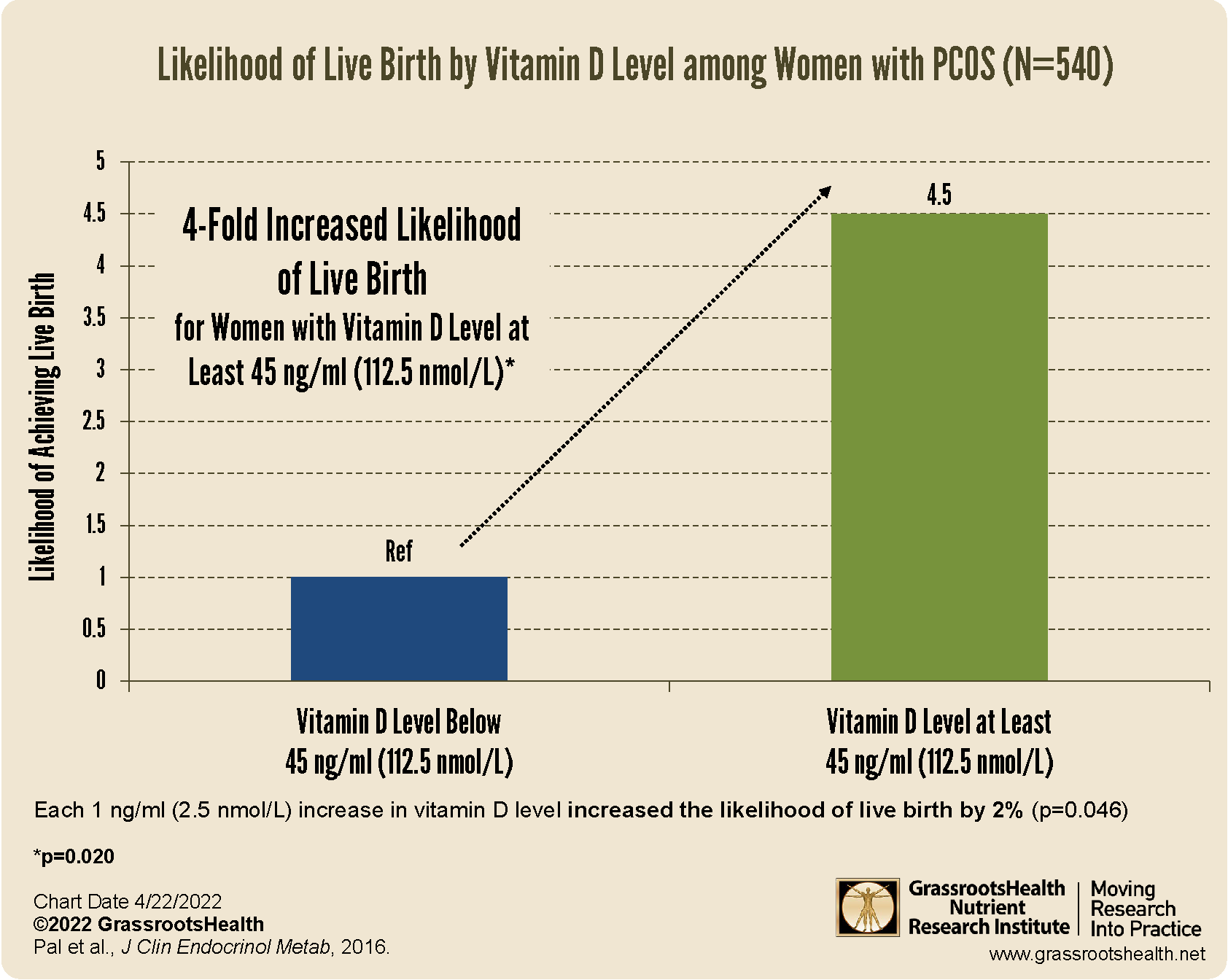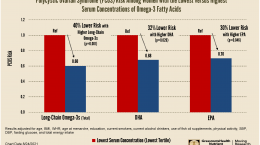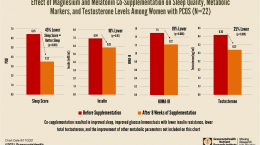Published on April 25, 2022
A review outlines the research on vitamin D and reproductive health among both men and women with or without PCOS
Key Points
- Vitamin D levels in the range of 40-60 ng/ml (100-150 nmol/L) have been shown to reduce complications including preterm birth, hypertensive disorders of pregnancy (preeclampsia) and gestational diabetes
- A study found that vitamin D level was an independent predictor of reproductive success rates in women with PCOS following induction of ovulation, with the probability of ovulation and live birth increasing as vitamin D levels increased; live births were 44% lower among women whose vitamin D levels were below 30 ng/ml (75 nmol/L) and 4 fold higher among women with vitamin D levels of 45 ng/ml (112.5 nmol/L) or higher, and the ratio of live births increased by 2% for every one ng/ml (2.5 nmol/L) increase in vitamin D levels
- Studies in men have shown a correlation between vitamin D sufficiency and improved sperm count, motility, and increased fertility overall, with a positive association between vitamin D and testosterone levels among older men
 Vitamin D is necessary for all stages of the life-cycle, and especially for pregnancy. Numerous studies have found that higher vitamin D levels during pregnancy reduce the risk of adverse maternal and infant outcomes. Vitamin D levels in the range of 40-60 ng/ml (100-150 nmol/L) have been shown to reduce complications including preterm birth, hypertensive disorders of pregnancy (preeclampsia) and gestational diabetes. The Pregnancy Disease Risk Reduction Chart provides an illustration of some of the findings from studies that have compared prenatal and newborn health outcomes to vitamin D levels. It shows the percent lower risk at a given vitamin D level compared to a common reference level of 25 ng/ml (62 nmol/L), which is the approximate average level of the U.S. population.
Vitamin D is necessary for all stages of the life-cycle, and especially for pregnancy. Numerous studies have found that higher vitamin D levels during pregnancy reduce the risk of adverse maternal and infant outcomes. Vitamin D levels in the range of 40-60 ng/ml (100-150 nmol/L) have been shown to reduce complications including preterm birth, hypertensive disorders of pregnancy (preeclampsia) and gestational diabetes. The Pregnancy Disease Risk Reduction Chart provides an illustration of some of the findings from studies that have compared prenatal and newborn health outcomes to vitamin D levels. It shows the percent lower risk at a given vitamin D level compared to a common reference level of 25 ng/ml (62 nmol/L), which is the approximate average level of the U.S. population.
Vitamin D is also involved in the process of conception, implantation and the development of the placenta, and vitamin D levels in both men and women can have an effect on fertility and the chances of having a live birth. A paper by Várbíró et al. reviewed findings from recent research on vitamin D in men and women, fertility, IVF success rates, and pregnancy among women with or without Polycystic Ovary Syndrome (PCOS).
Vitamin D Deficiency Occurs in 67-85% of PCOS Cases
PCOS is one of the most frequent causes of infertility among women, with evidence that both insulin resistance and vitamin D status play key roles. Among PCOS patients, vitamin D supplementation has been shown to have positive effects on the menstrual cycle, follicular maturation, and endometrial receptivity during implantation of the embryo. A study included in the review, by Pal et al., found that vitamin D level was an independent predictor of reproductive success rates in women with PCOS following induction of ovulation, with the probability of ovulation and live birth increasing as vitamin D levels increased.
In fact, live births were 44% lower among women with PCOS whose vitamin D levels were below 30 ng/ml (75 nmol/L) and 4 fold higher among women with vitamin D levels of 45 ng/ml (112.5 nmol/L) or higher. For these women, the ratio of live births increased by 2% for every one ng/ml (2.5 nmol/L) increase in vitamin D levels. Women with PCOS undergoing IVF also have a higher chance of both implantation and occurrence of clinical pregnancy when vitamin D levels were higher, and vitamin D levels have also correlated with embryo quality.
How Vitamin D Levels among Men and Women Affect Fertility and IVF Outcomes
In women, vitamin D plays key roles the production of the ovarian steroid hormones progesterone, estradiol, and estrone, as well as follicular stimulation hormone (FSH) and follicular maturation and selection. During fertilization, the vitamin D level of the woman facilitates the sperm selection process and influences the selection of the ‘best sperm.’ For outcomes among IVF patients, vitamin D levels are strongly correlated with the rate of success, independently of age, BMI, ethnicity, and the number of embryo transfers.
Studies in men have shown a correlation between vitamin D sufficiency and improved sperm count, motility, and increased fertility overall. There is a positive association between vitamin D and testosterone levels among older men, however this same relationship is not seen in young adolescent males.
Ensure Healthy Vitamin D Levels Among All Reproductive-Age Individuals
 Having and maintaining healthy vitamin D levels and other nutrient levels can help improve your health now and for your future. Choose which additional nutrients to measure, such as your omega-3s and essential minerals including magnesium and zinc, by creating your custom home test kit today. Take steps to improve the status of each of these measurements to benefit your overall health. With measurement you can then determine how much is needed and steps to achieve your goals. You can also track your own intakes, symptoms and results to see what works best for YOU.
Having and maintaining healthy vitamin D levels and other nutrient levels can help improve your health now and for your future. Choose which additional nutrients to measure, such as your omega-3s and essential minerals including magnesium and zinc, by creating your custom home test kit today. Take steps to improve the status of each of these measurements to benefit your overall health. With measurement you can then determine how much is needed and steps to achieve your goals. You can also track your own intakes, symptoms and results to see what works best for YOU.
Enroll in D*action and Test Your Levels Today!






